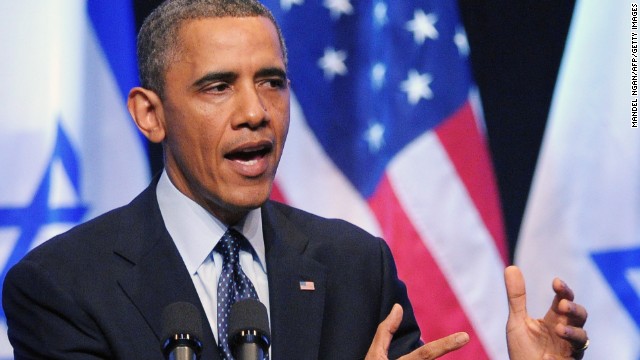
Obama: 'We cannot give up' on peace for Israel, Palestine
In a speech in Jerusalem
that Obama had said would lay out his vision for the region, the
president urged Israelis to look at the world through the eyes of
Palestinians but also said enemies of Israel must change their rhetoric
and tactics to reflect modern reality.
Hours before the speech
on the second day of a Middle East swing, two rockets fired from
Palestinian-controlled Gaza landed in southern Israel.
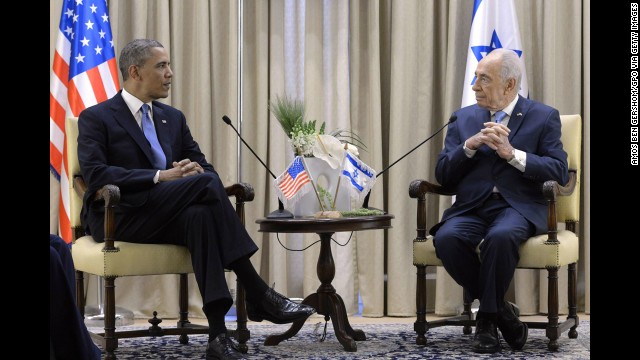 Photos: Obama visits Israel
Photos: Obama visits Israel
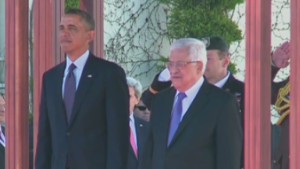 President Obama arrives in Ramallah
President Obama arrives in Ramallah
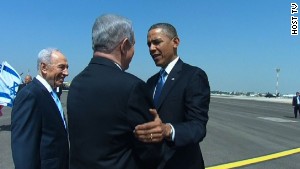 Obama in Israel for historic visit
Obama in Israel for historic visit
They caused no injuries
or major damage, but served as a symbolic welcome to Obama's visit to
the West Bank on Thursday to meet with Palestinian President Mahmoud
Abbas. A hardline group claimed responsibility.
Israel honors Obama
In another symbolic
moment, Obama received Israel's highest civilian honor -- the
Presidential Medal of Distinction -- Thursday night from Israeli
President Shimon Peres at a state dinner that emphasized the close ties
between their countries.
Noting the similarity
between the histories of Israelis and African-Americans as former slaves
who endured hardship before gaining freedom in a new land, Obama said,
"Our very existence, our presence here tonight, is a testament that all
things are possible."
The earlier talks with
Abbas served as a counterbalance to Obama's meetings the previous day
with Israeli Prime Minister Benjamin Netanyahu, setting up the Jerusalem
speech that addressed crucial issues of the stalled peace process as
well as regional concerns such as the civil war in neighboring Syria and
Iran's efforts to develop a nuclear weapon.
When Obama mentioned the
name of Abbas in his speech Thursday, some boos erupted in the
Jerusalem Convention Center among the audience of mostly young Israelis.
He also was interrupted at one point by a protester's shouts, causing
the president to joke that the heckling "made me feel at home" in
reference to the caustic political climate in Washington.
Obama acknowledged the
difficulty in resolving the Israeli-Palestinian impasse, but insisted
that "peace is possible" and called on young Israelis to make it happen.
"Political leaders will
not take risks if the people do not demand that they do," Obama said to
applause, adding a familiar theme from his U.S. campaign speeches in
declaring "you must create the change that you want to see."
Such a direct appeal to
young Israelis was a "bold and courageous" move by Obama, according to
Martin Indyk, a former U.S. ambassador to Israel who now is vice
president and director of foreign policy at the Brookings Institution in
Washington.
Noting that the
president lowered expectations before his trip of what he could
accomplish, Indyk told CNN that Obama now raised expectations "sky high"
that he was going to personally work to make peace possible.
Kerry staying for more talks
Recently appointed
Secretary of State John Kerry, who accompanied Obama on the trip that
ends Friday in Jordan, will stay on to hold more talks with Israeli
leaders, a senior administration official told reporters in a background
briefing.
"We've done a lot of
talking, a lot of listening over the course of the last two days, we'll
do some more tomorrow, and then I think it'll be appropriate for
Secretary Kerry to discuss next steps when he returns here," the
official said.
Obama said in his speech
that he believes "the Israeli people do want peace, and you have every
right to be skeptical that it can be achieved," arguing that an end to
the seemingly endless conflict is necessary and "the only path to true
security" for Israel.
"Given the demographics
west of the Jordan River, the only way for Israel to endure and thrive
as a Jewish and democratic state is through the realization of an
independent and viable Palestine," Obama said. "Given the frustration in
the international community, Israel must reverse an undertow of
isolation. And given the march of technology, the only way to truly
protect the Israeli people is through the absence of war -- because no
wall is high enough, and no Iron Dome is strong enough, to stop every
enemy from inflicting harm. "
At the same time, he
urged Israelis to empathize with the plight of Palestinians, using
direct and harsh imagery to make his point.
"Put yourself in their
shoes -- look at the world through their eyes," he said. "It is not fair
that a Palestinian child cannot grow up in a state of her own, and
lives with the presence of a foreign army that controls the movements of
her parents every single day. It is not just when settler violence
against Palestinians goes unpunished. It is not right to prevent
Palestinians from farming their lands; to restrict a student's ability
to move around the West Bank; or to displace Palestinian families from
their home."
He added that "neither
occupation nor expulsion is the answer," saying, "just as Israelis built
a state in their homeland, Palestinians have a right to be a free
people in their own land."
Arab states must seek
normalized relations with Israel, and Palestinians must "recognize that
Israel will be a Jewish state, and that Israelis have the right to
insist upon their security," Obama also said.
Obama: Israeli settlements 'counterproductive'
He prompted applause
from the young Israeli crowd when he criticized their government's
controversial policy of building new settlements in disputed
territories.
"Israelis must recognize
that continued settlement activity is counterproductive to the cause of
peace, and that an independent Palestine must be viable -- that real
borders will have to be drawn," Obama said.
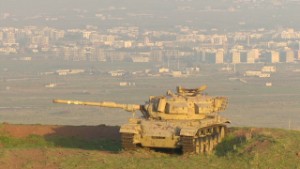 Israelis watching the war next door
Israelis watching the war next door
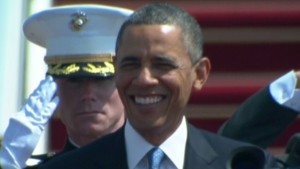 Obama's open mic slip in Israel
Obama's open mic slip in Israel
On a personal note, the
president told how he met with young Palestinians before his speech and
they differed little from his own daughters, adding that he believed
Israeli parents would want Palestinian youths to succeed if they had a
chance to talk to them.
During his earlier visit
to to Ramallah in the West Bank, Obama stressed the need for direct
talks between Israelis and Palestinians for a two-state solution.
"The Palestinian people
deserve an end to occupation and the daily indignities that come with
it," he said at a news conference with Abbas, adding that Palestinians
deserve "a future of hope" and a "state of their own."
Obama said he and Abbas
discussed, among other things, the Israeli settlements and the issue of
Palestinian prisoners. He called for shunning the old habits, arguments
and formulas that have stymied the peace process and envisioned "two
nations, two neighbors at peace, Israel and Palestine."
At the news conference
and in his later speech, Obama said the foundation for a peace agreement
exists if both sides can overcome internal and external obstacles and
pressure, and can join together making the leap.
The core issues right now, Obama said, are achieving sovereignty for Palestinians and security for Israel.
"That's not to say
settlements are not important," he told reporters. "It is to say that if
we solve those two problems, the settlement problem will be solved. So I
don't want to put the cart before the horse. I want to make sure that
we are getting to the core issues and the substance."
During a news conference
on Wednesday with Netanyahu, neither leader mentioned the settlements,
showing the sensitivity of the issue for the conservative prime minister
who just formed a new coalition government after a narrow election
victory.
In Ramallah on Thursday,
Obama praised the Palestinian Authority led by Abbas but said Hamas,
which governs Gaza, "has the responsibility to prevent" violations of a
cease-fire with Israel such as the two rockets fired in the morning.
Abbas: Peace 'is necessary'
Abbas, however, said the
Israeli settlements are "more than a hurdle to peace," calling them
illegal and saying it was Israel's duty to stop building them.
At the same time, Abbas
said Palestinians believe peace "is necessary and inevitable," and it
should not be made through violence, occupation, walls, denial of
refugee rights or settlements -- reciting a list of Palestinian
grievances against Israel.
He envisioned a Palestinian state based on 1967 borders with Jerusalem as capital -- a scenario unacceptable to Israel.
On Wednesday, Obama and Netanyahu offered a "good cop-bad cop" approach to Iran's nuclear ambitions.
Both countries have
accused Iran of secretly working toward building a nuclear weapon, and
Netanyahu made it clear Wednesday after his talks with Obama that he
believes the president is equally committed to preventing a
nuclear-armed Iran.
In comments to reporters
Wednesday and in Thursday's speech, Obama called for more diplomacy on
Iran while endorsing Israel's right to defend itself as it sees fit. He
also insisted that "all options" remain open -- code for a military
strike to disable the Iranian program.
That prompted a warning
Thursday from Iran's supreme leader, Ayatollah Khamenei, that Tehran
would destroy Tel Aviv if Israel were to attack its nuclear facilities.
Obama also warned the
Syrian government that using chemical weapons against opposition forces
or allowing such weapons to be obtained by terrorists would be a
"game-changer" in terms of U.S. involvement in the conflict. His
administration has been criticized for not providing military aid to the
Syrian opposition.
On Wednesday, Obama
sought to assure Netanyahu and Israelis of his commitment to their
security and to strengthen what have been strained personal and working
relationships between the two men.
In what Netanyahu called
a key development, the leaders announced new talks on extending U.S.
military assistance to Israel for another 10 years past the current
agreement, which expires in 2017.
No comments:
Post a Comment